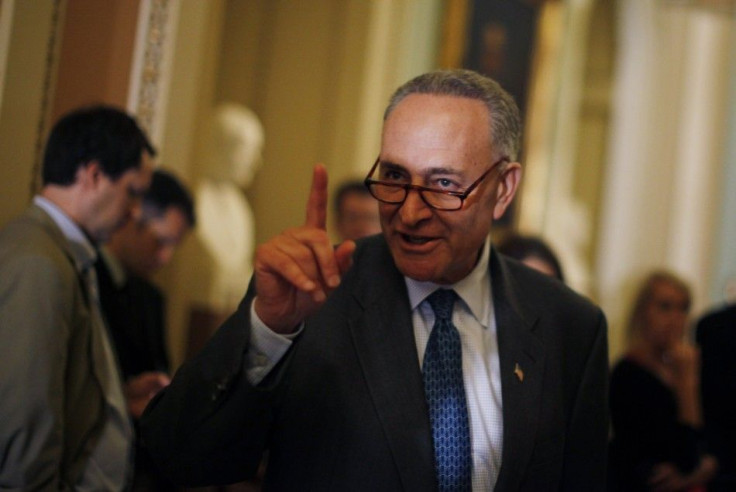Schumer Doubts Super Committee Can Reach Deal

As the budget deficit super committee's deadline looms, lawmakers are giving mixed signals about the chances a $1.2 trillion deal can be ironed out by Nov. 23.
Various reports pit an increase in tax revenue -- and what form it will take -- as the main sticking point for the committee of six Republicans and six Democrats.
Several reports over the weekend show some degree of measurable progress, but then U.S. Sen. Chuck Schumer, D-N.Y., threw a curveball Monday by telling MSNBC, I don't think the Super Committee is going to succeed because our Republican colleagues have said 'no net revenues.' When Democrats move too far left, we lose. We're now - the basic mainstream of Democrats...we're willing to move to the middle. They are not willing to do any revenues.
Visit msnbc.com for breaking news, world news, and news about the economy
Schumer's assertion that the super committee's Republicans will avoid tax increases follows a letter released by U.S. Sen. Jim DeMint, R-S.C., stating no net tax increase remains the goal.
The comments make Schumer the first high-level lawmaker to express skepticism over the super committee's prospects, as other leaders within the House and Senate have publicly expressed a belief in the prospects of a deal. But developments over the last week have made getting a definitive sense of where the parties stand difficult.
While Schumer said the whole committee may fail, some lawmakers asserted bigger goals are realistic, with U.S. Rep. Xavier Becerra, D-Calif., and U.S. Rep. Mike Simpson, R-Idaho, expressing positions that meet somewhat in the middle of both parties' rhetoric, with $4 trillion as the goal through actual revenue increases.
Their statements followed 100 legislators signing a letter calling for the consideration of new revenue when composing a comprehensive deal.
The super committee, formally known as the Joint Select Committee on Deficit Reduction, was established as part of a deficit reduction deal, the Budget Control Act, in exchange for raising the nation's debt ceiling on Aug. 2. While the U.S. government was allowed to borrow up to $2.4 trillion more through 2013, the super committee was charged with reaching a bipartisan consensus on $1.2 trillion in deficit reduction over the next decade, in addition to the roughly $900 billion in deficit reduction Congressional Republicans and President Barack Obama agreed to as part of the August debt deal.
Congress then has until Dec. 23 to pass the recommendations, otherwise trigger cuts, in the form of slashes to defense spending and Medicare benefits, would be automatically enacted.
© Copyright IBTimes 2024. All rights reserved.




















